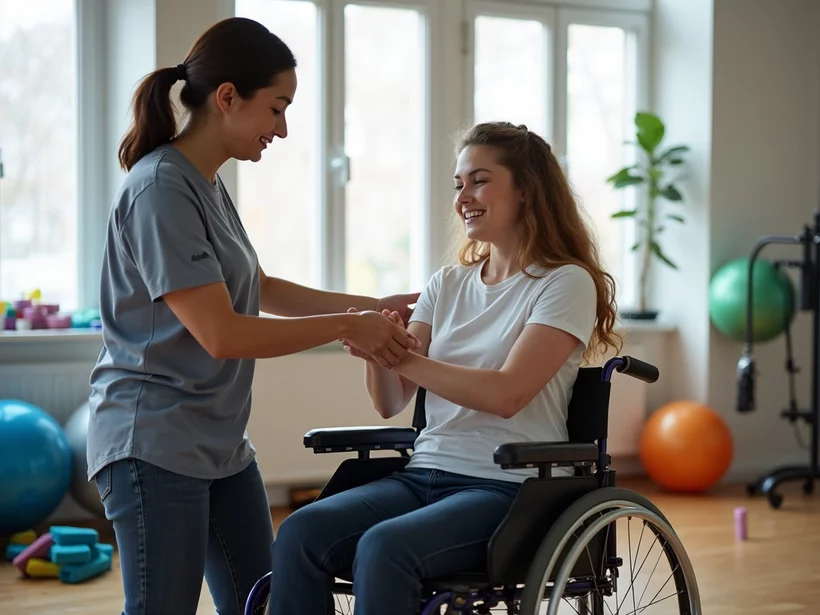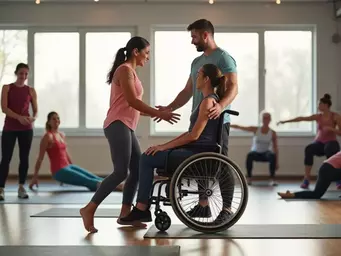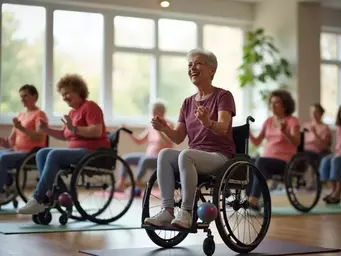Exercise Physiology in NDIS Support

What if a tailored exercise program could significantly improve your quality of life? Much more than just physical activity, exercise physiology offers personalized movement strategies that can enhance health and well-being, especially for individuals with disabilities. Understanding its role within the National Disability Insurance Scheme (NDIS) is key to unlocking its benefits. Let's dive into some essential takeaways from this topic.
What You Will Learn
- Exercise physiology focuses on creating tailored movement programs that enhance overall health and functional capacity for individuals with disabilities.
- Engaging with an Exercise Physiologist can improve mobility and independence by enhancing strength, flexibility, balance, and coordination.
- Regular physical activity supports mental health by reducing symptoms of anxiety and depression, thus fostering a sense of achievement and community.
- Exercise physiology can effectively manage chronic diseases, helping individuals control pain, blood sugar levels, and improve cardiovascular health.
- Tailored exercise programs lead to specific health benefits, including weight management, improved cardiovascular fitness, and better sleep quality.
- Exercise physiology services are beneficial for a range of conditions, including physical and intellectual disabilities, as well as chronic health issues.
- NDIS funding for exercise physiology can be accessed under categories like capacity building supports and improved health and well-being, debunking common myths around coverage.
- Flexible service delivery models such as in-clinic sessions, home visits, and hydrotherapy ensure accessibility for all participants.
- Accredited Exercise Physiologists provide evidence-based, client-centered care that is essential for achieving effective outcomes.
- Collaboration with allied health professionals and education for carers is crucial in maximizing the benefits of exercise physiology services.
Key Benefits of Exercise Physiology in NDIS Support
Explore the significant advantages of engaging with an Exercise Physiologist, illustrated below:
Enhancing Mobility and Independence
Through exercise programs, participants can:
- Improve strength and flexibility
- Enhance balance and coordination
- Reduce the risk of falls and injuries
Improving Mental Health through Exercise
Regular physical activity leads to:
- Reduction of anxiety and depression symptoms
- Release of endorphins for mood elevation
- A sense of achievement and community
Chronic Disease Management
Tailored exercise programs can help:
- Manage chronic pain
- Control blood sugar levels for diabetes
- Improve cardiovascular health
Health Benefits of Tailored Programs
These programs yield specific benefits, including:
- Weight management
- Improved cardiovascular fitness
- Better sleep quality
Understanding the Role of Exercise Physiology in NDIS Support
When it comes to navigating the National Disability Insurance Scheme (NDIS), many people often wonder, “What can exercise physiology really do for me?” At Health Moves, we believe that understanding the role of exercise physiology can empower individuals with disabilities to make the most out of their NDIS supports. For a deeper dive into how exercise physiology is integrated within NDIS frameworks, explore our article on NDIS and Exercise Physiology Insights. Let's explore what exercise physiology is, how it connects to the NDIS, and the unique benefits it offers to enhance well-being.
Defining Exercise Physiology and NDIS
What is Exercise Physiology?
Exercise physiology is a field focused on the study of how movement affects our body and health. Exercise Physiologists (EPs) like those at Health Moves specialize in creating personalized movement programs tailored to individual needs. This practice is not just about physical activity, but about improving overall health, enhancing functional capacity, and promoting long-term well-being, especially for those with disabilities.
Overview of the National Disability Insurance Scheme (NDIS)
The NDIS is a support system designed to help people with disabilities in Australia access the services they need to live their best lives. It provides funding to eligible participants for a range of supports, including exercise physiology services. Understanding your NDIS plan can feel overwhelming, but it’s crucial for unlocking the potential benefits that tailored movement programs offer for both physical and mental health!
Key Benefits of Exercise Physiology in NDIS Support
Enhancing Mobility and Independence
One of the most significant advantages of engaging with an Exercise Physiologist is the enhancement of mobility and independence. Through carefully designed exercise programs, participants can:
- Improve strength and flexibility
- Enhance balance and coordination
- Reduce the risk of falls and injuries
At Health Moves, we’ve seen firsthand how these improvements can make a world of difference in people’s lives, allowing them to participate more fully in their daily activities. To learn more about how EPs can help, check out our guide on Exercise Physiologists in NDIS Explained.
Improving Mental Health through Exercise
Exercise has a profound effect on mental health, often reducing symptoms of anxiety and depression. Regular physical activity leads to the release of endorphins, which can elevate mood and improve overall mental well-being. This is particularly beneficial for individuals facing emotional challenges alongside their physical disabilities. Think about how exercise can be a natural mood booster, fostering a sense of achievement and community!
Chronic Disease Management and Functional Capacity
For individuals managing chronic diseases, exercise physiology plays a key role in maintaining health and functional capacity. Tailored exercise programs can help:
- Manage chronic pain
- Control blood sugar levels for diabetes
- Improve cardiovascular health
These programs are crucial not only for physical health but also for enhancing **quality of life**. At Health Moves, we believe in the power of movement to transform lives! For more info on how NDIS can support your goals through movement, read about NDIS Goals Through Movement Programs.
Health Benefits of Tailored Exercise Programs
Every individual is unique, and so are their needs. Tailored exercise programs can yield specific health benefits, including:
- Weight management
- Improved cardiovascular fitness
- Better sleep quality
By focusing on personal goals and abilities, Exercise Physiologists at Health Moves create a supportive environment that fosters growth and development.
Who Can Benefit from Exercise Physiology Services?
Identifying Target Populations: Disabilities and Conditions
Exercise physiology services are beneficial for a wide range of conditions, including but not limited to:
- Physical disabilities
- Intellectual disabilities
- Chronic health conditions
Understanding who can benefit from these services is essential for maximizing the value of NDIS supports.
Case Studies: Real-World Outcomes and Experience
At Health Moves, we have numerous success stories showcasing the positive impact of exercise physiology. For example:
- A young adult with cerebral palsy significantly improved their mobility through a tailored exercise program.
- A participant with diabetes managed their condition better with specific exercise recommendations.
These real-world outcomes highlight the transformative power of personalized movement strategies!
Community Participation and Inclusion Strategies
Exercise physiology not only promotes individual health benefits but also encourages community participation. By fostering social connections through group exercises or community activities, we break down barriers and promote inclusion. Think about the joy of participating in a fun fitness class with friends—these moments can truly enhance one’s quality of life. Detailed information on building effective Movement Programs for Disabilities is available on our site.
Understanding NDIS Funding for Exercise Physiology
How NDIS Funds Exercise Physiology Under Broader Categories
Understanding how NDIS funding works for exercise physiology can feel complicated. However, funds are typically allocated under broader support categories, such as:
- Capacity building supports
- Improved health and well-being
- Participation in community
Getting clear on funding options can help you make the most of your NDIS plan!
Myths and Misconceptions about NDIS Funding for Exercise Physiologists
There are many myths surrounding NDIS funding, which can lead to confusion. Some common misconceptions include:
- Exercise physiologists are not covered under NDIS.
- Only physical therapy is funded.
At Health Moves, we are here to clarify these myths and ensure participants understand their options for accessing exercise physiology services through NDIS.
Service Delivery Models for Exercise Physiology
Types of Services Offered: In-Clinic, Home Visits, Hydrotherapy
Exercise physiology services can be delivered through various models to suit individual needs. At Health Moves, we offer:
- In-clinic sessions for personalized care
- Home visits for participants who prefer exercising in their own environment
- Hydrotherapy for those who benefit from water-based activities
These options provide flexibility and accessibility, ensuring that everyone can engage in effective exercise.
Tailored Programs and Assessments for Individual Needs
Each participant has unique needs, which is why tailored programs are essential. An initial assessment allows Exercise Physiologists to:
- Identify personal goals
- Evaluate physical capabilities
- Design a customized exercise plan
At Health Moves, we ensure that every program is crafted with the individual's goals in mind, promoting the best outcomes!
Individualized Care Plans and Goal Setting
Creating an individualized care plan is vital in guiding the exercise journey. This plan includes:
- Short and long-term goals
- Progress tracking methods
- Regular reviews and adjustments
By focusing on goal setting, we can celebrate achievements, big and small, throughout the journey!
Professional Standards and Provider Expertise
Accreditation and Qualifications of Exercise Physiologists
To ensure high-quality service delivery, it's essential to work with accredited Exercise Physiologists. These professionals hold qualifications that require:
- A degree in exercise physiology
- Registration with relevant professional bodies
- Continuous professional development
This expertise guarantees participants receive evidence-based support tailored to their needs.
Client-Centered Approaches in Service Delivery
At Health Moves, we emphasize client-centered approaches that respect and value each participant's unique journey. This means:
- Listening to individual concerns and preferences
- Involving participants in decision-making
- Adapting programs based on feedback
By fostering collaboration, we create an empowering environment that promotes success!
Evidence-Based Practice in Exercise Physiology
Utilizing evidence-based practices ensures that our exercise programs are effective and safe. By relying on current research and best practices, we can:
- Implement proven strategies
- Monitor participant outcomes
- Adjust programs as needed to optimize benefits
This commitment to evidence-based practice is what sets Health Moves apart in supporting participants on their NDIS journey.
Collaborative Practices in NDIS Support
Working with Other Allied Health Professionals
Collaboration with other allied health professionals enhances the support we provide. Working together with:
- Occupational therapists
- Physiotherapists
- Speech pathologists
ensures comprehensive care that addresses all aspects of a participant's health and well-being. This teamwork can lead to improved outcomes and a holistic approach to care.
Education for Carers and Families to Support Exercise Goals
Empowering families and carers with knowledge is vital in supporting exercise goals. We believe in:
- Providing educational resources
- Offering workshops on exercise strategies
- Encouraging open communication between EPs and families
By ensuring everyone is on the same page, we create a supportive network that fosters success!
Pro Tip
Did you know? Engaging with an Exercise Physiologist can significantly enhance not just physical health, but also mental well-being. To maximize the benefits of your tailored exercise program, consider setting specific, achievable goals with your Exercise Physiologist. This can help maintain motivation and track progress, making your journey through the NDIS even more rewarding!
Frequently Asked Questions About NDIS and Exercise Physiology
- What is Exercise Physiology in the context of NDIS?
- Exercise physiology within NDIS focuses on creating personalized movement programs for individuals with disabilities to improve their overall health, functional capacity, and long-term well-being.
- How does Exercise Physiology improve mobility and independence?
- Tailored exercise programs enhance strength, flexibility, balance, and coordination, which directly contributes to improved mobility and greater independence in daily activities.
- Can Exercise Physiology help with mental health?
- Yes, regular physical activity prescribed by an Exercise Physiologist can reduce symptoms of anxiety and depression, elevate mood through endorphin release, and foster a sense of achievement and community.
- Is Exercise Physiology covered by NDIS funding?
- Yes, NDIS funding typically covers exercise physiology services under broader categories such as "capacity building supports" and "improved health and well-being," contrary to some common misconceptions.
- What types of services are offered by Exercise Physiologists?
- Services include in-clinic sessions, home visits, and hydrotherapy, all tailored to individual needs based on initial assessments and goal setting.
Future Trends and Policy Changes in Exercise Physiology within NDIS
The landscape of exercise physiology within the NDIS is ever-evolving, with significant trends and changes on the horizon. At Health Moves, we are keenly aware of how these shifts can impact the lives of individuals with disabilities. By staying informed, we can better support our clients in navigating their options and making the most of available services.
One exciting development comes from Exercise and Sports Science Australia (ESSA). They have been actively advocating for the inclusion of exercise physiology in national guidelines and funding models. This engagement highlights the critical role that exercise plays in improving health outcomes and the necessity for policy reforms that support individuals with disabilities in accessing these vital services.
Reviewing Recent Developments from Exercise and Sports Science Australia (ESSA)
ESSA has been pivotal in promoting the benefits of exercise for individuals with disabilities. Their recent initiatives include:
- Advocating for funding models that prioritize exercise physiology services.
- Developing resources and guidelines to enhance service delivery across the sector.
- Conducting research to demonstrate the effectiveness of exercise interventions in managing disabilities.
These efforts are essential for ensuring that exercise physiology becomes a standard part of NDIS support, thus enriching the lives of participants and promoting independence.
Potential Changes to Funding and Service Delivery in NDIS
As we look to the future, several potential changes to NDIS funding and service delivery could significantly impact exercise physiology services. Some of these include:
- Increased funding allocations specifically for exercise physiology.
- Enhanced flexibility in how clients can access services, including options for telehealth.
- Improved collaboration with other health professionals to create comprehensive care plans.
At Health Moves, we are excited about these possibilities, as they align with our mission to empower individuals with disabilities through tailored movement programs. Staying informed about these changes helps us advocate effectively for our clients.
Emerging Strategies for Rehabilitation and Pain Management
Incorporating physical activity into rehabilitation and pain management is becoming increasingly important. Research shows that regular exercise can be a game changer for those with chronic conditions. Here are a few strategies we are seeing more in practice:
- Customized exercise plans focusing on strength, flexibility, and endurance.
- Group classes that foster community and encourage participation.
- Integration of pain management techniques with physical activity to enhance overall well-being.
These strategies underscore the importance of exercise in a holistic approach to health, and they align perfectly with our philosophy at Health Moves. By embracing these methods, we can help our clients achieve better outcomes and enhance their quality of life.
The Role of Support Coordination in Enhancing Client Outcomes
Support coordination plays a vital role in helping clients navigate their NDIS journey. By working closely with exercise physiologists like those at Health Moves, coordinators can:
- Facilitate connections between clients and appropriate services.
- Advocate for necessary supports and funding.
- Assist in goal setting and tracking progress over time.
Through collaboration and communication, support coordinators ensure that clients receive tailored services that meet their unique needs. This teamwork is essential for fostering independence and enhancing quality of life for individuals with disabilities.
Recap of Key Points
Here is a quick recap of the important points discussed in the article:
- Understanding Exercise Physiology: Exercise physiologists create personalized movement programs to improve health and functional capacity for individuals with disabilities.
- NDIS Support: The NDIS provides funding for exercise physiology services, which can enhance mobility, independence, and overall well-being.
- Benefits of Tailored Programs: Tailored exercise programs can manage chronic diseases, improve mental health, and promote community participation.
- Service Delivery Models: Exercise physiology services can be delivered in various formats, including in-clinic sessions, home visits, and hydrotherapy.
- Collaboration is Key: Working with allied health professionals enhances the effectiveness of exercise physiology and ensures holistic care for clients.
- Future Trends: Ongoing advocacy for exercise physiology within the NDIS aims to improve funding, service delivery, and integration into comprehensive care plans.









